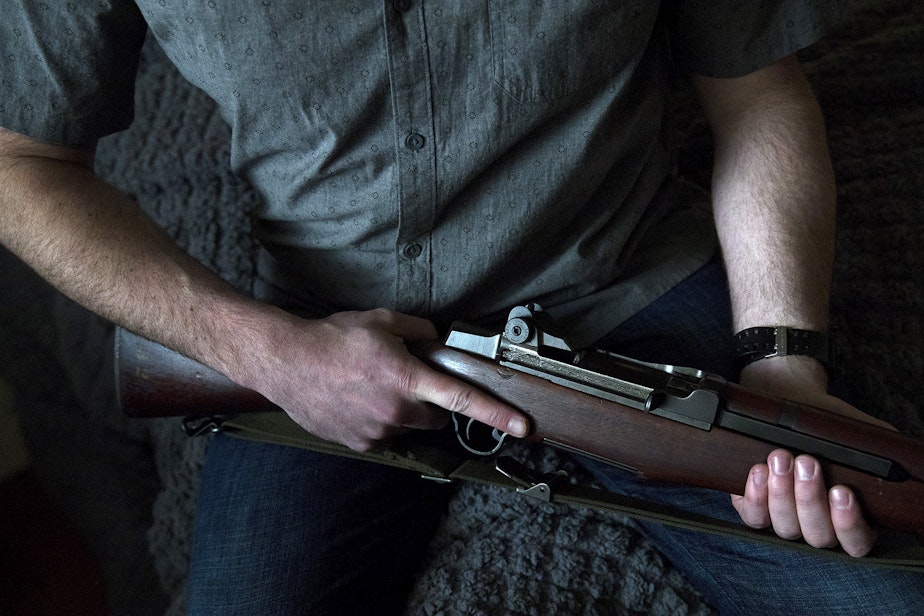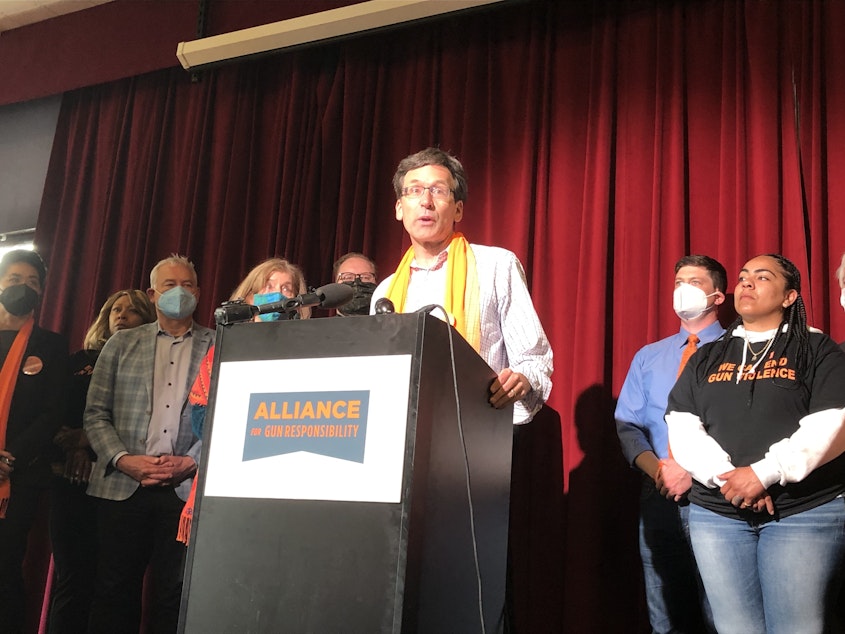Washington voters' role in gun laws: ballots vs bills

The U.S. is once again mourning dozens of lives lost in multiple mass shootings.
A “mass shooting” is typically defined as a single incident in which four or more people are shot, either injured or killed. Those that have dominated the headlines and political debate recently claimed the lives of 19 children and two adults May 24 in Uvalde, Texas, and 10 Black adults 10 days earlier at a supermarket in Buffalo, New York.
Because these events are all too common now in our country, the debates that have followed have been predictable.
Assault-style weapons, like the rifles used in both Uvalde and Buffalo, remain a cornerstone of those debates, including here in Washington.
Washington Attorney General Bob Ferguson has advocated for the ban of those weapons for years now.
“Those AR-15s are legal in Washington state," he said during a press conference after the shooting in Uvalde. "They should not be legal in Washington state. I have proposed, six years in a row, banning the sale of assault weapons like the AR-15. And every year, it has gone nowhere. I don’t know what more we need than seeing what unfolded in Texas.”
That devastating school shooting, in particular, has sparked renewed calls for gun reform. But could it, as other tragedies have done, actually move the needle?
Olympia correspondent Austin Jenkins spoke to KUOW's Angela King about how Washington came to adopt many of its gun-control measures and whether the powers that be are ready to take another step with an assault-weapons ban.
Sponsored
This interview with Austin Jenkins has been edited for clarity.
Angela King: First of all, give us a quick reminder of what gun laws we do have in Washington state.
Austin Jenkins: There are several that have been put in place – by voters and by state lawmakers – since the mass shooting at Sandy Hook Elementary School in Connecticut a decade ago.
They include voter initiatives to expand background checks, to establish extreme risk protection orders, sometimes referred to as a "red flag" law, and to raise the age to buy a semi-automatic rifle.
At the Capitol, state lawmakers have banned bump stocks like the one used in the 2017 mass shooting in Las Vegas. They’ve also passed laws to crack down on untraceable so-called ghost guns and to restrict the open carry of guns in places like the state Capitol, public meetings and public demonstrations. And this year, majority Democrats outlawed the sale of gun magazines that hold more than 10 rounds.
Sponsored
We heard Attorney General Bob Ferguson advocating for a ban on assault-style weapons. That’s one proposal that has not been adopted here yet. Why is that?
The simple answer is that it hasn’t had the political support and it hasn’t been put on the ballot as an initiative for voters to decide. It’s notable that Washington’s Alliance for Gun Responsibility – which is the primary group behind the gun law changes here in the last decade – did not include an assault weapons ban on its 2022 legislative agenda.
I was looking at Gallup’s national polling on this issue as of 2019, and that polling showed a slight majority of respondents opposing a ban. Now, the numbers might be different here in Washington. But if you’re going to go to the ballot with something, the general rule of thumb is that you want to start with about 60% support because you’re going to lose support as the campaign goes on. So, so far advocates haven’t tried to bring this to voters. And while Attorney General Bob Ferguson has been pushing for a ban for years, majority Democrats in the Legislature haven’t moved to advance Ferguson’s bill.

Could this change now?
Sponsored
It remains to be seen. For starters, we’ll have to see what happens in the November elections and how that affects the make-up of the state Legislature. But, the Uvalde shooting – like Sandy Hook – could be a galvanizing moment. And it could spur action – either legislatively or at the ballot. I mean Governor Jay Inslee, when he was in Congress in the 1990s, voted for the federal assault weapons ban and has backed Ferguson's proposal for a state ban. There is support for the idea in Olympia.
When we talk about the laws in any state, I’m sure lots of people assume we’re talking about proposals that went through state lawmakers. But it’s important to note that a lot of the gun laws that are on the books here actually went through voters, as you've mentioned.
That’s true. It used to be that, even when Democrats had the majority in Olympia, they wouldn’t pass major gun-control legislation. It was viewed as too politically fraught. These were the days when there were more rural Democrats in the Legislature. Out of that inaction in Olympia and out of the Sandy Hook shooting came a very strategic effort to take these issues directly to voters.
The Washington Alliance for Gun Responsibility formed in 2013 right after Sandy Hook and, with funding from former New York Mayor Michael Bloomberg’s group, Everytown for Gun Safety, ran an initiative in 2014 to expand background checks to include person-to-person gun sales. It passed overwhelmingly. And from there it was about every other year that another carefully poll-tested gun measure showed up on the ballot and passed.
But what also happened is the Alliance for Gun Responsibility got involved in legislative races and worked to elect what it calls “gun responsibility” candidates. So, as the Legislature has grown more diverse and, frankly, more liberal, that old rule that gun control only passes at the ballot fell away and the Legislature started passing what advocates call “gun safety” measures.
Sponsored
We know gun-rights advocates are not happy with any laws they see as infringing on their Second Amendment rights. For example, Attorney General Bob Ferguson asked for – and state lawmakers passed – a ban on high-capacity magazines that hold more than 10 rounds. That’s now being challenged in the U.S. District Court for Western Washington.
Alan Gottlieb is the founder of the Second Amendment Foundation, which filed the lawsuit. His argument is the state uses tragedies like the Uvalde shooting to pass unfair restrictions on Washingtonians' Second Amendment rights.
"Everybody’s scared about the increase in violent crime in our country, particularly involving firearms, gun owners alike," he told KUOW recently. "We’re not happy about any of this, but taking away people’s rights – who do not commit crimes, that have no propensity of committing crimes – just because somebody goes and misuses something, doesn’t make sense in our society at all. We wouldn’t tolerate it for cars or anything else. But somehow, guns get demonized."
So, Austin, what are gun rights advocates in the state Legislature saying and doing about the proposed changes and restrictions?
As we all know, guns divide America and they divide the Legislature. Republicans have been in the minority here for several years, but they’ve been very opposed to most, if not all, of these changes. Generally, what we hear is that these are attacks on the Second Amendment and on Washington’s even stronger state constitutional protection to bear arms. Opponents often say these laws infringe upon the rights of lawful gun owners and won’t do anything to stop criminals. They question whether the changes in law are making people safer – and in fact, argue they’re not.
Sponsored
But lacking the political power to stop these laws from being passed, there’s been little minority Republicans can do to stand in the way of these changes. So, that’s why gun-rights groups are turning to the courts – as we’re seeing with this new lawsuit challenging the magazine size limit. There was also a recent ruling out of the 9th Circuit Court of Appeals overturning California’s ban on the sale of semi-automatic firearms to people younger than 21. I’ve been told that case doesn’t have direct implications for Washington’s 21-and-up law, but it could potentially open the door to similar legal challenges here. And I think if Washington were to ban assault weapons, that would almost certainly lead to legal challenges as we’ve also seen in California.
So, we’re still more than six months away from the next legislative session. It’ll be another budget year with lots of ideas competing for attention and political willpower. I know it’s early, Austin, but do you get the sense we’ll see much gun-related debate/proposals in the 2023 session?
I think almost certainly we’ll see new proposals. Already, Attorney General Bob Ferguson has said he will reintroduce the assault weapons ban bill. He’s also talking about a bill to make it easier to sue gun manufacturers – who are mostly immune from liability now stemming from shootings. But with this looming court action the advocates may also be playing defense, trying to protect the laws that are already on the books.
Let’s talk briefly about the upcoming midterms. How are state Democrats, who hold the majority in both state chambers, feeling right now?
They’ve got to be worried. National polling shows a high level of voter dissatisfaction with President Biden and with Congress. We know that the party in power tends to lose congressional seats during the midterm elections. And legislative elections are very much affected by what’s happening nationally – as much as candidates would like to believe local issues animate voters. Currently, Democrats have a healthy majority in the House and a more tenuous hold on the state Senate. It would be quite the feat – given the electoral map – for Republicans to flip both chambers. But it’s happened before.
Could they get one chamber? Maybe. Bottom line, even if Democrats hold onto their majorities, I think it’s a safe bet that they’ll lose some seats and things will be tighter than they currently are – and that could affect their ability to advance new gun restriction legislation.






